Best Oil for Leather
Like any material, leather requires proper care and maintenance to stay in top condition. And one of the most important steps in leather care is using the right oil.
In this post, we’ll explore the world of leather oil and help you choose the best oil for your leather items.
We’ll discuss the different types of oil available, the factors to consider when choosing an oil, and how to properly apply and store the oil. We’ll also cover common mistakes to avoid and answer frequently asked questions about leather oil.
So, if you’re ready to learn more about leather oil and how to care for your leather items, let’s dive in!
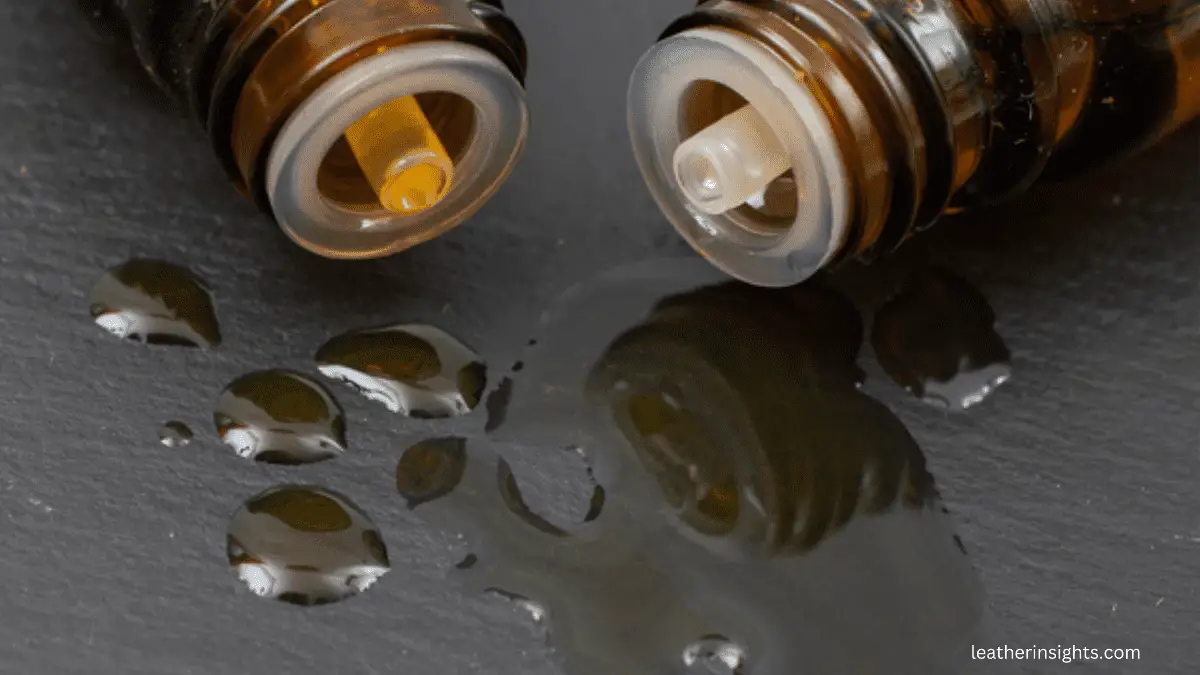
What is Leather Oil?
Leather oil is a specially formulated product designed to moisturize, condition, and protect leather goods. It typically consists of a blend of natural oils, waxes, and other ingredients that penetrate the leather’s pores, replenishing lost moisture and restoring its suppleness.
Leather oils come in various forms, including liquid oils, creams, and balms, each offering unique application methods and benefits.
The Importance of Leather Care
Proper leather care is essential for maintaining the longevity and appearance of leather products. Leather is a natural material that can dry out, crack, and lose its luster if not treated with care.
Regular conditioning with leather oil helps to prevent these issues by replenishing the moisture that naturally diminishes over time.
Additionally, leather oils provide a protective layer that shields the leather from environmental factors such as sunlight, moisture, and pollutants. By incorporating leather care into your routine, you can extend the lifespan of your leather goods and keep them looking their best.
Is Oil Bad for Leather?
While it may seem counterintuitive, using the right type of oil on leather is actually beneficial and necessary for its maintenance. However, it is crucial to use oils specifically designed for leather care, as using the wrong type of oil can have detrimental effects.
For example, oils like vegetable oil or motor oil should never be used on leather, as they can leave a greasy residue, attract dirt, and potentially damage the leather over time.
Leather oils that are specifically formulated for leather care, on the other hand, are designed to be absorbed by the leather without leaving a residue. These oils nourish the leather, replenish its natural oils, and enhance its appearance.
It’s important to note that different types of leather may require different oils, so it’s advisable to consult the manufacturer’s recommendations or seek professional advice to ensure the best results.
Which is the Best Oil for Leather?
When it comes to choosing the best oil for your leather items, there are many options to consider. Let’s take a closer look at some of the most popular oils on the market.
Note: When deciding which oil to use on your leather item, it’s important to consider the specific type of leather and the intended use of the item.
1. Mink Oil
Mink oil is a popular choice for conditioning leather since it’s all-natural oil obtained from the fur of minks.
It’s known for its ability to penetrate deeply into the leather fibers and restore its natural oils.
Additionally, it’s a great waterproofing agent making it a good choice for outdoor leather items like boots and jackets.
However, mink oil can darken leather over time, so it’s not the best choice for lighter-colored leather.
2. Olive Oil
This natural oil is a common household item that can also be used for leather care.
It helps to condition and soften the leather, making it more supple and resistant to cracking.
However, it’s not the best choice for leather care, as it can cause the leather to become greasy and attract dust and dirt.
3. Linseed Oil
Linseed oil is another natural oil that can be used on leather that is made from flax seeds.
Linseed oil can be used on leather to help condition and protect it as well as enhance its natural shine.
but it can take a long time to dry and can leave the leather feeling sticky or tacky.
It’s also prone to yellowing over time, which can be a problem for lighter-colored leathers.
4. Mineral Oil
Mineral oil is a synthetic petroleum-based oil that is at times used in leather care products.
In leather care, it is often used as a substitute for more expensive natural oils such as mink oil or neatsfoot oil.
This makes it a good option for conditioning and protecting leather items that do not require frequent exposure to moisture or extreme environmental conditions.
On the downside, mineral oil does not penetrate the leather fibers as deeply as natural oils, which means it may not provide as thorough or long-lasting protection.
5. Coconut Oil
Coconut oil is a popular natural oil for conditioning leather as it’s easy to apply and absorbs quickly.
It helps to soften the leather and protect it from moisture and wear.
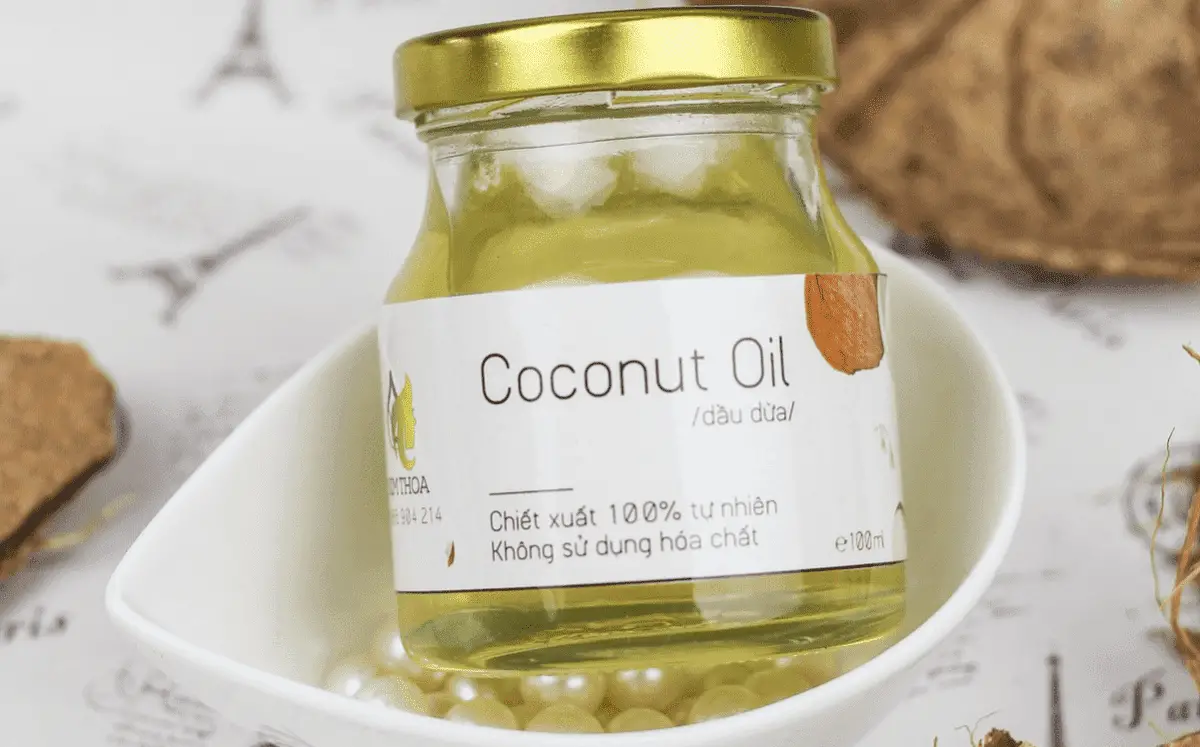
However, it can leave a greasy residue on the leather, so it’s not the best choice for use on clothing or other items that will come into contact with the skin.
Additionally, it may not be the best choice for use on leather items that are frequently exposed to water, as it can cause the leather to become overly saturated and prone to damage.
Nonetheless, if used properly and sparingly, coconut oil can be an effective and natural alternative to synthetic oils.
6. Vegetable Oil
Vegetable oil is another common household item that can be used for leather care.
It helps to condition and soften the leather as well as provide a protective barrier against moisture and wear.
On the downside, it can attract dust and dirt and leave the leather feeling greasy. Also, it’s prone to rancidity over time, which can cause the leather to deteriorate.
7. Jojoba Oil
This natural oil is derived from the seeds of the jojoba plant and is known for its ability to penetrate deeply into the leather.
It is similar in composition to the oils produced by the human body making it a good choice for conditioning leather and enhancing its natural shine.
It’s also less prone to rancidity than other natural oils and won’t leave the leather feeling greasy or sticky.
8. Almond Oil
This is a natural oil that is similar in composition to jojoba oil and can be used to condition leather.
It’s a popular choice for conditioning leather because it is lightweight and absorbs quickly leaving the leather feeling soft and supple.
Also, it helps to protect it from moisture and wear.
9. Neatsfoot Oil
This oil is derived from the shin bones and feet of calves.
It’s been used for centuries to condition leather and is a popular choice for use on saddles and other equestrian items.
It helps to soften the leather and protect it from moisture and wear.
However, neatsfoot oil is used too much, it can darken leather, so use it sparingly.
10. Vaseline
Vaseline is a petroleum-based product that can be used on leather to provide a protective barrier.
It’s often used as a cheap alternative to leather oil as it helps to protect the leather from moisture.
However, it is not recommended for long-term use as it can cause the leather to dry out and crack.
11. Beeswax
Beeswax is a natural wax that can be used to condition and protect leather.
It forms a protective barrier on the surface of the leather, which helps to repel water and prevent damage from the elements.
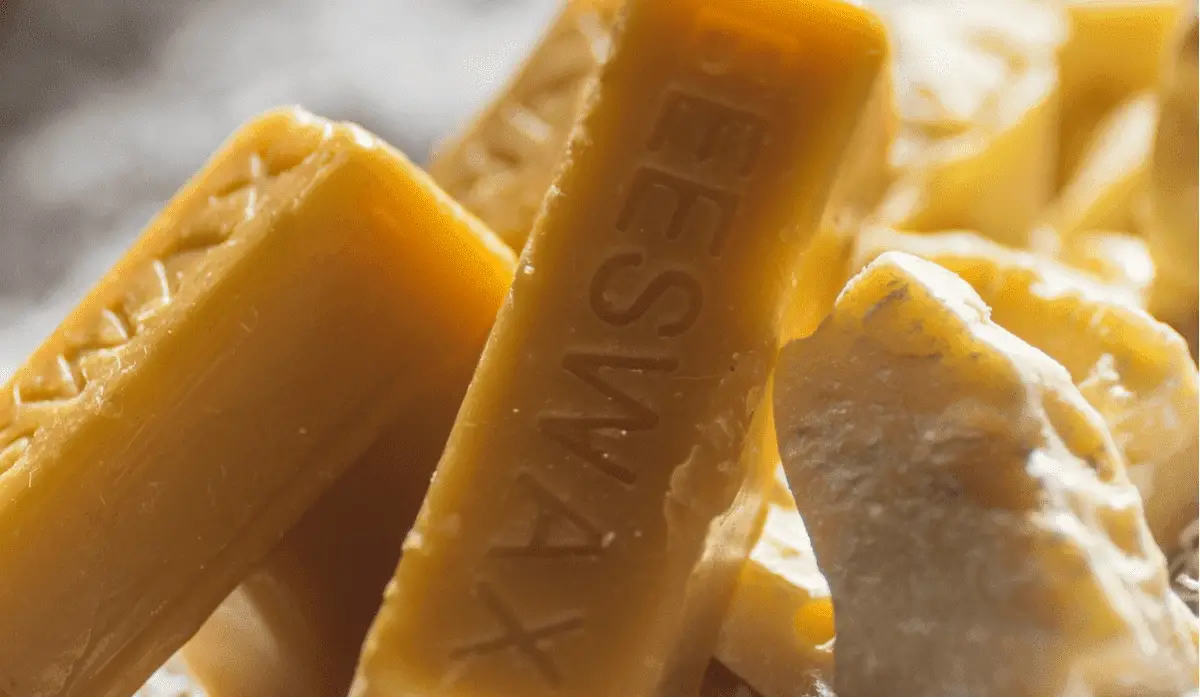
It’s a great option for use on leather jackets and bags.
12. Argan oil
This natural oil is derived from the kernels of the argan tree and is known for its moisturizing properties.
It’s a great option for leather care as it contains high levels of fatty acids and vitamin E, which work to nourish and protect the leather.
Its moisturizing properties also help to soften the leather to prevent it from drying out and cracking.
However, it is important to note that argan oil can be expensive and may not be the best option for all types of leather.
It’s important to note that while some people recommend using household oils like coconut oil or olive oil as a substitute for leather oil, this is not always a good idea. These oils may be too heavy for some types of leather, and can cause the leather to feel slippery and greasy or attract dirt and debris.
Leather Oil for Specific Uses
Different types of leather require specific care and maintenance to ensure their longevity and appearance.
Leather Oil for Shoes
Shoes endure significant wear and tear, exposing them to dirt, moisture, and harsh environmental conditions. A leather oil specifically formulated for shoes can help nourish the leather, restore its flexibility, and provide a protective barrier against water and stains.
Look for shoe-specific leather oils that are easy to apply and suitable for different types of footwear, including dress shoes, boots, and athletic shoes.
Leather Oil for Saddles
Saddles and other equestrian gear are subjected to rigorous use and constant exposure to the elements. A high-quality leather oil formulated for saddles can help maintain their integrity and extend their lifespan.
These oils often contain additional ingredients that provide deep conditioning, waterproofing, and protection against sweat and abrasions.
Leather Oil for Jackets
Leather jackets are a popular fashion staple known for their durability and timeless appeal. To keep your leather jacket looking its best, opt for a leather oil specifically designed for jackets.
These oils typically contain nourishing ingredients that penetrate the leather, restore its moisture balance, and enhance its natural sheen.
Look for oils that provide conditioning benefits without leaving a heavy or greasy residue.
Leather Oil for Couches
Leather couches and furniture require regular maintenance to retain their luxurious look and feel. Leather oils designed for couches provide deep conditioning and protection against dryness, cracking, and fading.
These oils should be easy to apply and absorb quickly into the leather, leaving it supple and rejuvenated. Ensure that the oil is suitable for the specific type of leather used in your couch, such as full-grain, top-grain, or corrected-grain leather.
Leather Oil for Faux Leather
Faux leather, also known as synthetic leather or vegan leather, has become increasingly popular as an alternative to genuine leather. While faux leather does not require the same level of conditioning as genuine leather, specialized leather oils for faux leather can help maintain its appearance and prevent it from drying out or becoming brittle.
Look for oils specifically formulated for faux leather that provide a light moisturizing effect without causing any damage or discoloration.
Leather Oil for Suede and Nubuck
Suede and nubuck are delicate forms of leather with a velvety texture that requires specific care. Instead of traditional oils, specialized suede, and nubuck protectors or sprays are recommended for these types of leather.
These products help repel water, prevent staining, and restore the nap of the leather. It’s essential to follow the instructions provided with the product and perform a patch test before applying it to the entire surface of your suede or nubuck items.
Factors to Consider When Choosing a Leather Oil
Choosing the right leather oil can seem overwhelming with so many options available. However, considering a few factors can help you make an informed decision.
- Type of Leather
Different types of leather require different types of oil. For example, full-grain leather is best maintained with natural oils, while pigmented or coated leather is better suited for synthetic oils.
- Intended Use
Also, consider the use of the leather item when selecting an oil.
Leather items that are exposed to frequent wear and tear, such as shoes or bags, may require oils that offer more protection.
- Climate and Environmental Conditions
Environmental factors such as humidity and temperature can affect the condition of the leather.
So consider using oils that provide moisture if you live in a dry climate.
- Personal Preference
Finally, personal preference is also a key factor. Some people may prefer natural oils while others may opt for synthetic oils.
The Best Leather Oils
When it comes to choosing the best leather oil for your prized leather goods, there are several reputable brands known for their high-quality products.
Remember to consider the specific needs of your leather, such as its type, intended use, and personal preferences when selecting the best leather oil for optimal results.
Lexol
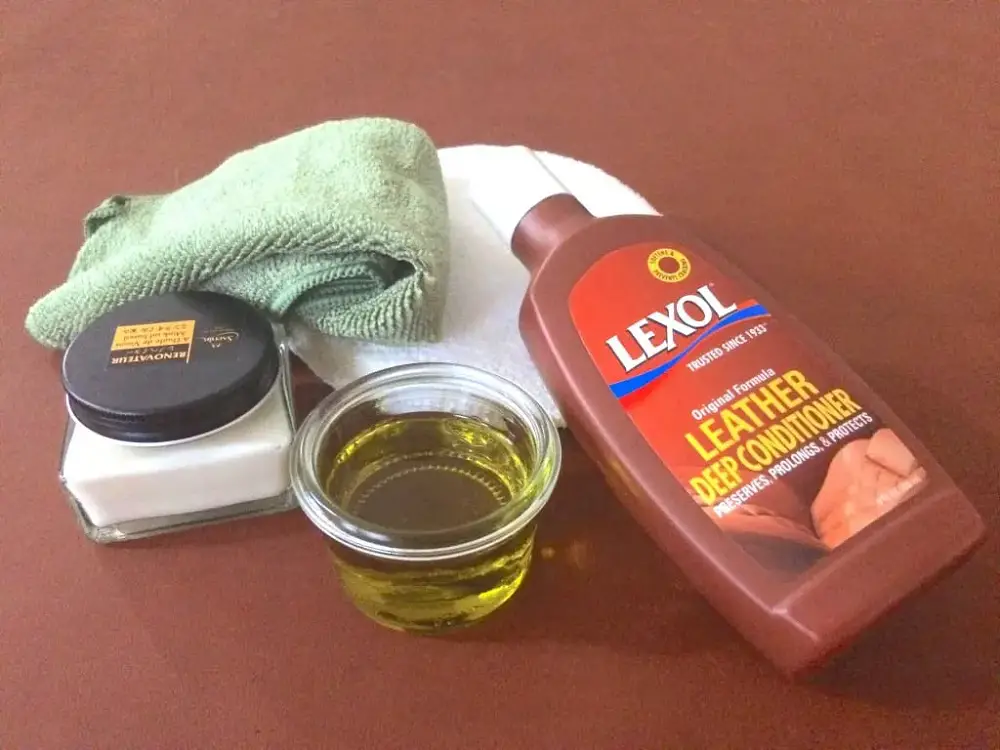
Lexol is a well-known brand in the leather care industry, offering a range of products designed to clean, condition, and protect leather. Their leather oil is formulated to penetrate deeply into the leather, replenishing moisture and restoring its natural oils.
Lexol leather oil is versatile and suitable for a wide range of leather goods, from furniture to automotive interiors and accessories.
Red Wing Heritage Mink Oil
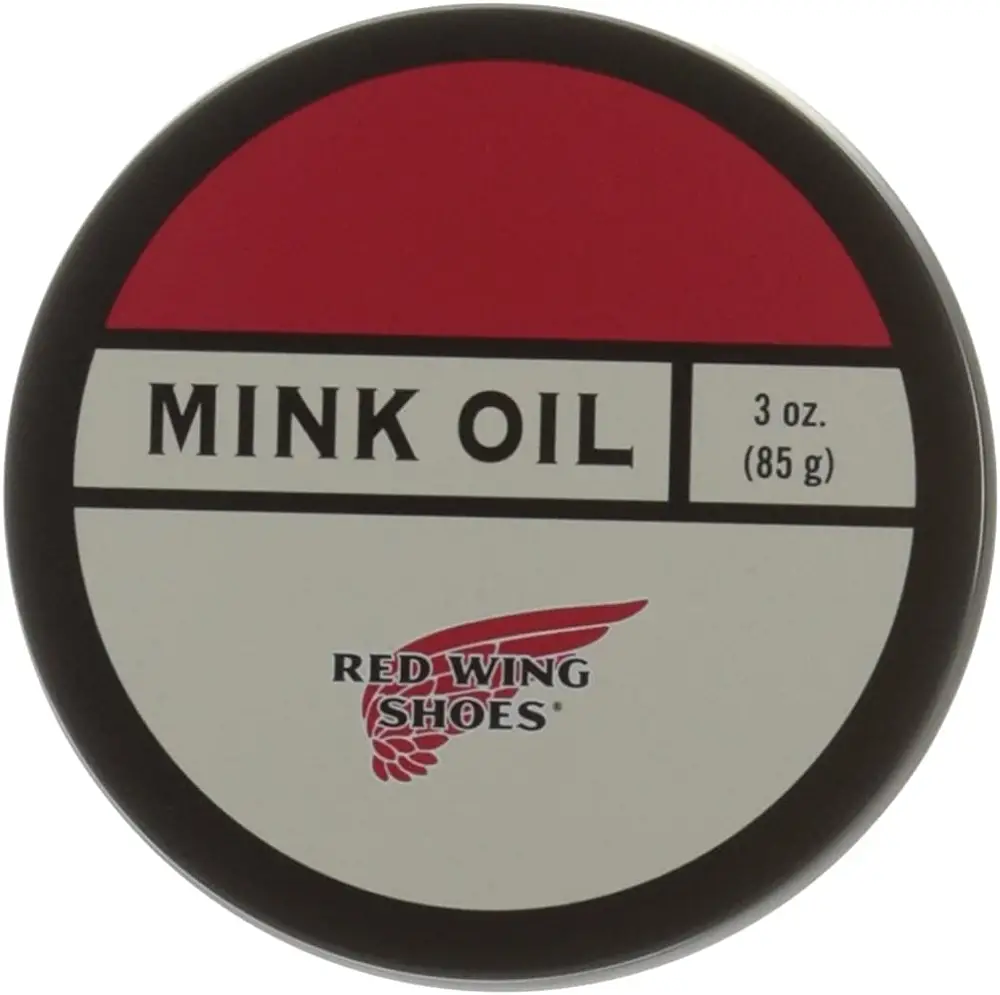
Red Wing Heritage is a trusted brand famous for its premium leather boots.
Their mink oil is specifically formulated to nourish and protect smooth-finished leathers, providing essential conditioning and waterproofing benefits. It helps maintain the leather’s suppleness and extends its lifespan, making it a popular choice among boot enthusiasts.
Saphir Medaille d’Or Mink Oil Polish
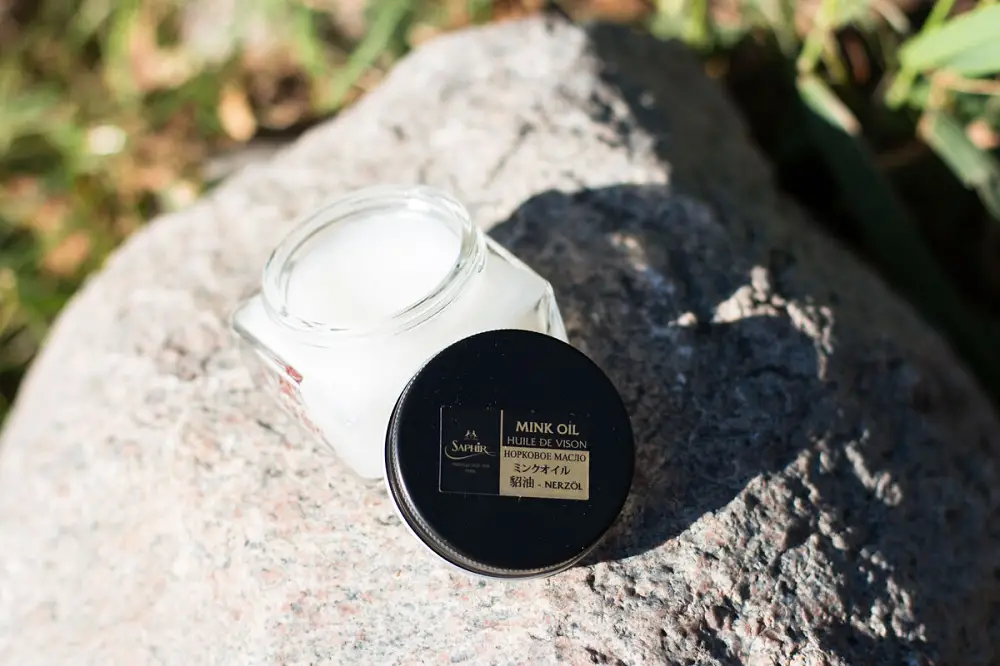
Saphir is a renowned French brand known for its high-quality leather care products. Their Medaille d’Or Mink Oil Polish is a luxurious blend of mink oil and other natural waxes that deeply condition and polish leather.
This product is favored by leather aficionados for its ability to restore luster and provide long-lasting nourishment.
Leather Honey
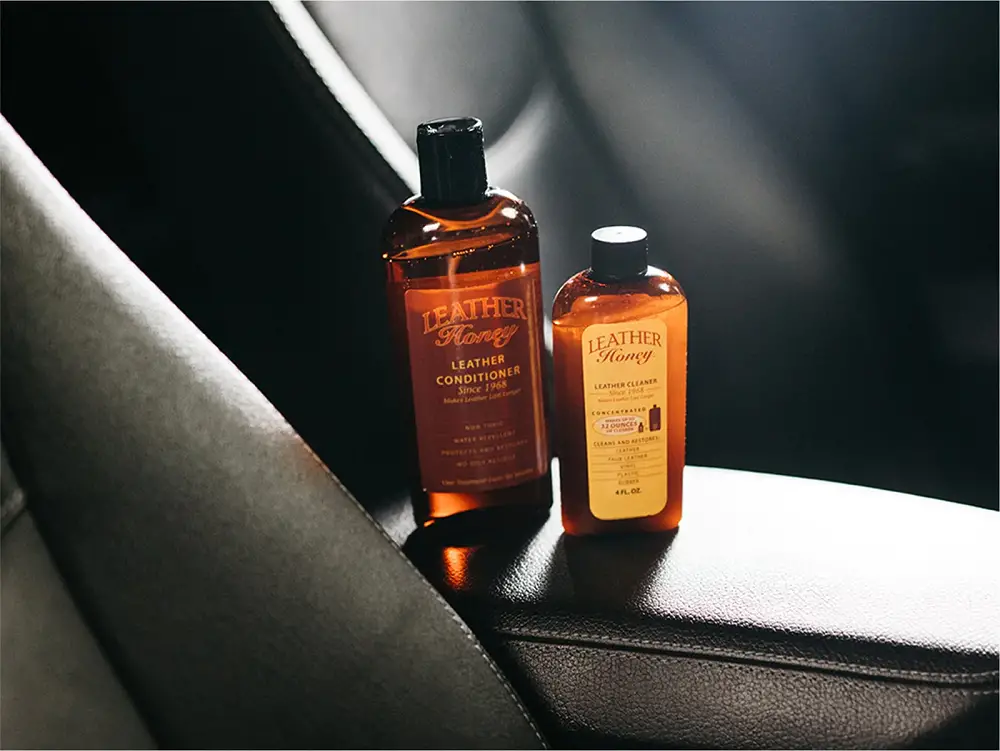
Leather Honey is a trusted name in leather care, offering a range of products loved by leather enthusiasts.
Their leather oil is specially formulated to penetrate deep into the leather, rejuvenating and softening it. It helps restore flexibility and prevents cracking, making it suitable for a variety of leather goods, including furniture, car interiors, and accessories.
Bickmore
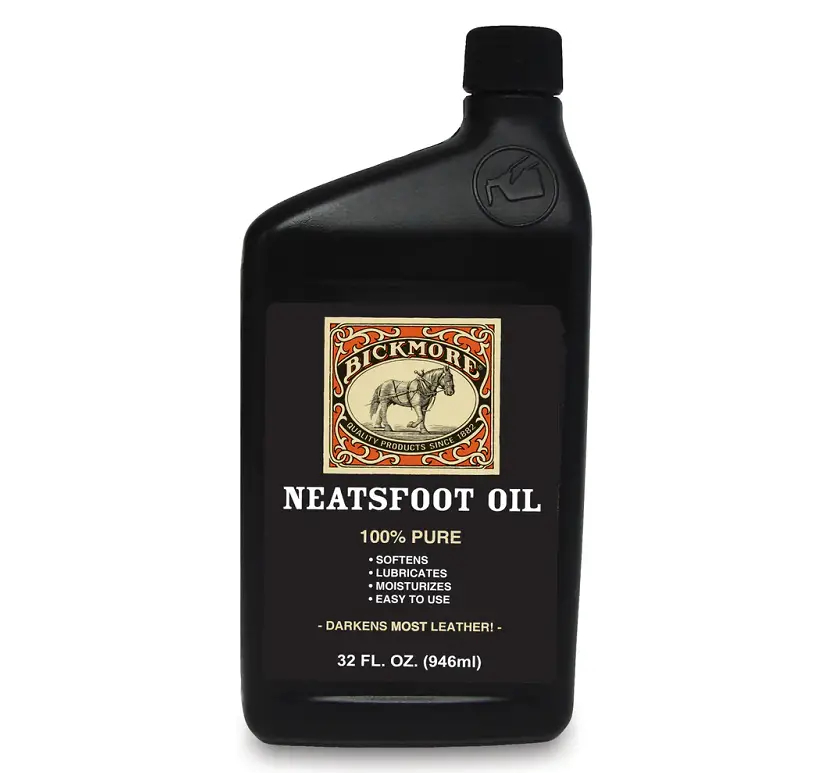
Bickmore is a reputable brand that has been producing high-quality leather care products for over 130 years. Their leather oil is formulated to condition, restore, and preserve leather’s natural beauty. It helps rejuvenate dry and brittle leather, enhancing its appearance and prolonging its lifespan.
Fiebing’s
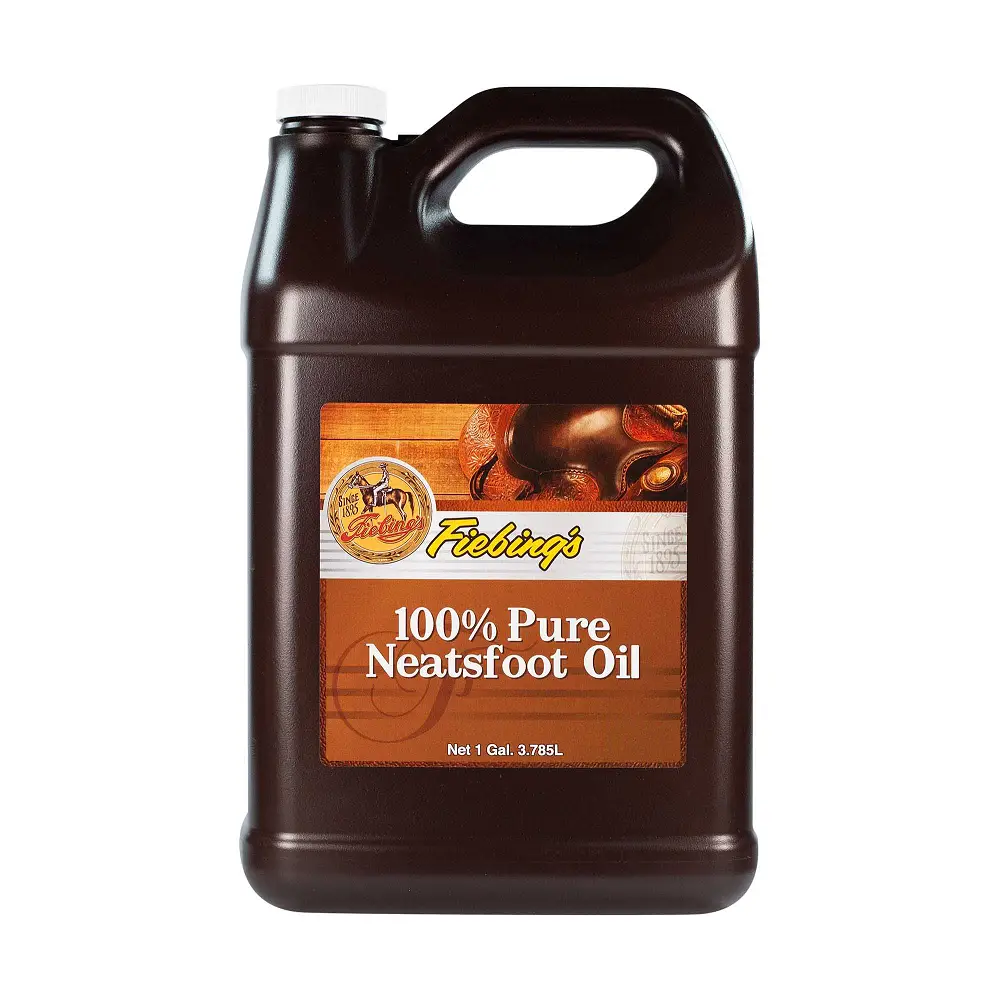
Fiebing’s is a well-established brand known for its leather dyes, finishes, and care products. Their leather oil is designed to moisturize and protect leather, preventing drying and cracking. It is suitable for use on a wide range of leather goods, including saddles, shoes, and bags.
Obenauf’s
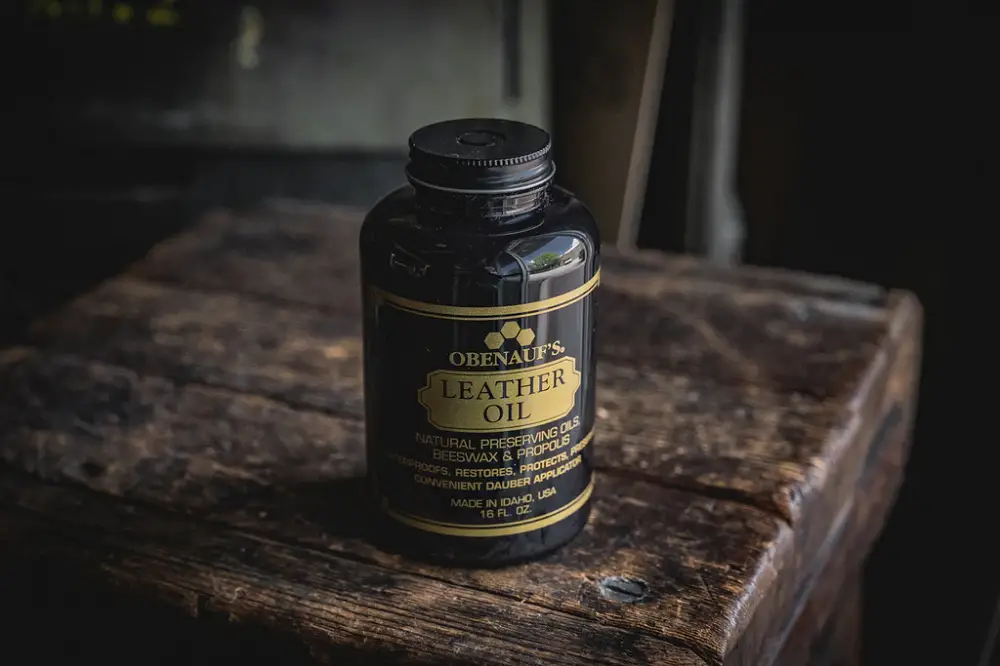
Obenauf’s offers a range of products designed to protect and preserve leather. Their leather oil is a blend of natural oils and waxes that penetrates deeply into the leather, restoring moisture and preventing cracking. It is particularly effective for heavy-duty leather and is commonly used for work boots, outdoor gear, and saddles.
Weaver Leather
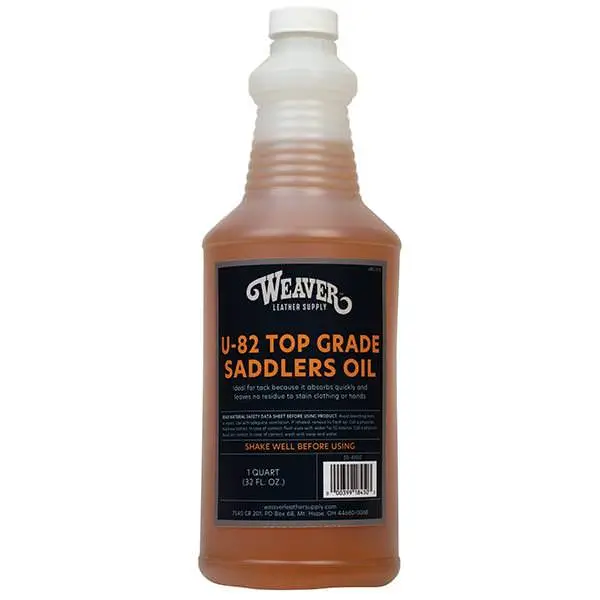
Weaver Leather is a trusted name in the equestrian world, offering a variety of products for horse care and leather maintenance. Their leather oil is formulated to moisturize and condition leather, keeping it soft and supple.
It is a popular choice among horse riders and leather enthusiasts for maintaining saddles, bridles, and other equestrian gear.
Farnam
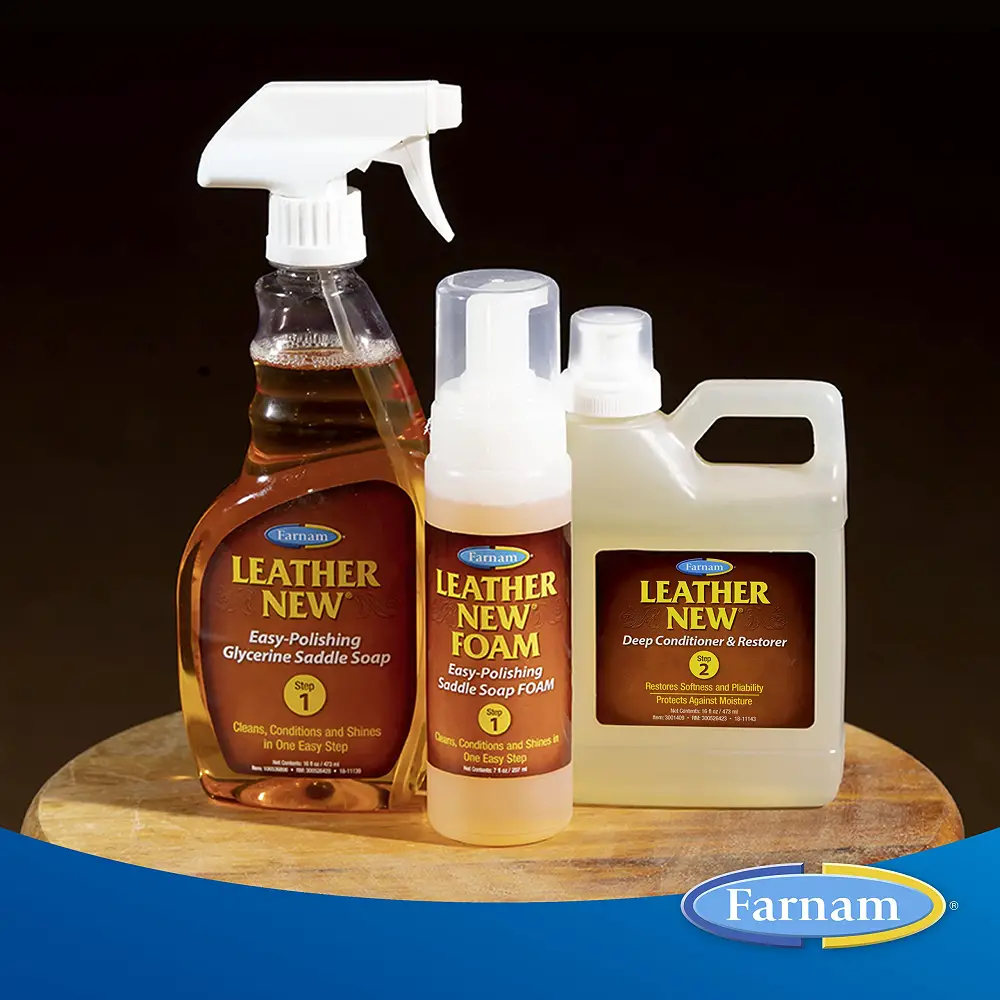
Farnam is a well-known brand in the equine industry, providing a range of products for horse care and leather maintenance. Their leather oil is designed to penetrate the leather’s fibers, replenishing moisture and preventing cracking. It is a reliable choice for conditioning and protecting leather saddles, tack, and boots.
Effax
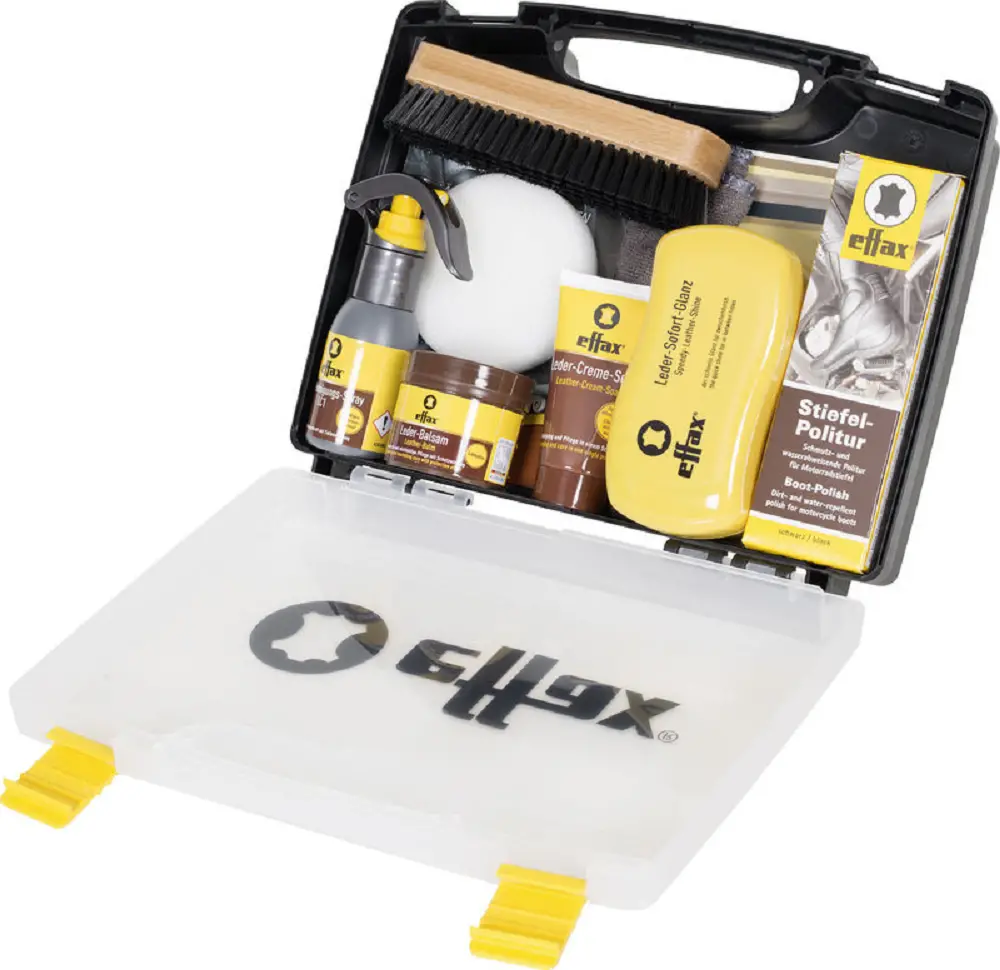
Effax is a German brand that offers a comprehensive range of leather care products. Their leather oil is formulated to nourish and protect leather, keeping it soft, supple, and resistant to water. It is suitable for a variety of leather goods, including shoes, bags, and furniture.
Sof Sole Mink Oil
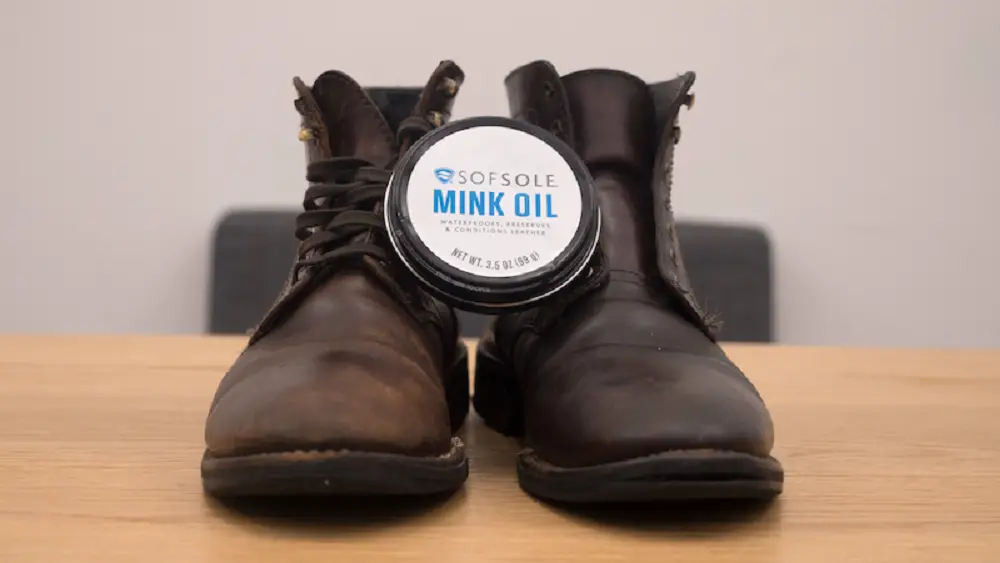
Sof Sole Mink Oil is a popular choice for leather enthusiasts looking to condition and waterproof their leather goods. This oil is specifically designed to penetrate deep into the leather, replenishing its natural oils and providing long-lasting protection.
It helps soften the leather, making it more comfortable to wear, and creates a barrier against moisture, preventing damage from water and other elements.
When to Use Leather Oil
Leather items are prone to dryness, cracking, and other damage. That’s why it’s important to use leather oil to protect them and extend their lifespan.
However, how do you know when to apply leather oil?
Here are some signs that indicate it’s time to use leather oil:
1. Dryness: When leather feels dry to the touch, it’s a sign that it needs conditioning.
2. Cracking: If you notice cracks in the leather, it’s a sign that it’s time to use oil to prevent further damage.
3. Stiffness: When leather becomes stiff and difficult to bend, it’s a sign that it needs conditioning.
4. Discoloration: Leather that has become discolored or faded may need oil to restore its natural color.
In general, it’s best to apply leather oil to your items every six months to one year. However, depending on the climate and frequency of use, you may need to apply the oil more often.
How Often to Apply Leather Oil
Now that you know when to use leather oil, it’s time to consider how often to apply it.
The frequency of application depends on several factors including the type of leather, how frequently you use the item and the environmental conditions.
For instance, if you live in a dry climate or use your leather items frequently, you may need to apply the oil more often.
In contrast, if you live in a humid climate or use your leather items infrequently, you may need to apply the oil less often.
Generally, to ensure that your leather items stay in good condition, it’s important to follow a regular maintenance schedule.
It’s recommended to apply the oil at least twice a year to avoid over-conditioning as it can lead to over-saturation and damage to the leather. It’s better to err on the side of caution and apply leather oil sparingly.
To determine if your leather item needs conditioning, inspect it regularly for signs of dryness or cracking. If the leather looks dull or feels rough to the touch, it’s time to apply oil. However, if the leather is still soft and supple, you may not need to apply oil just yet.
How to Apply Leather Oil
Now that you know when and how often to apply leather oil, let’s talk about how to apply it properly.
The process may vary slightly depending on the type of oil you use, but these general steps should work for most oils.
Step 1: Prepare the leather surface
Before applying the oil, make sure the leather surface is clean and dry.
Use a leather cleaner or mild soap and water to remove any dirt or stains and allow the leather to dry completely before proceeding.
If necessary, use a leather conditioner to restore any lost moisture before applying the oil.
Step 2: Apply the Oil
Using a clean, soft cloth or sponge, apply a small amount of oil to the leather surface.
Work the oil into the leather using circular motions, making sure to cover the entire surface evenly.
Be careful not to over-saturate the leather, as this can lead to damage.
Step 3: Let the oil soak in
Allow the oil to soak into the leather for at least an hour, or as recommended by the oil manufacturer.
This allows the oil to penetrate the leather and nourish it from within.
Step 4: Buff the Leather
Once the oil has dried, use a clean dry cloth to buff the leather surface gently. This step will help to remove any excess oil and give the leather a polished, soft, and supple finish.
Common Leather Oil Mistakes to Avoid
Using the wrong oil or applying it incorrectly can result in damage to your leather items.
Here are some common mistakes to avoid when using leather oil:
- Over-saturating the leather
Applying too much oil can cause the leather to become overly soft and stretchy, and may even result in discoloration or staining.
So it’s important to apply the oil in thin layers and to allow each layer to fully absorb before applying more.
- Using the wrong type of oil
Not all oils are created equal, and certain oils may be too heavy or too light for certain types of leather.
For example, vegetable oil may be too heavy for fine leather goods while mineral oil may not provide enough protection for outdoor gear.
- Applying oil to dirty or wet leather
Oil should only be applied to clean dry leather. Applying oil to dirty or wet leather can cause stains, discoloration, and even mold growth.
- Failing to test the oil first
Before applying any oil to your leather item, it’s important to test it on a small, hidden area first to ensure that it doesn’t cause any damage or discoloration.
- Applying oil too frequently
While it’s important to regularly condition and protect your leather items, applying oil too frequently can cause the leather to become overly soft and weak.
As a general rule, it’s best to apply oil every 6-12 months, depending on usage and environmental factors.
If you do make a mistake when using leather oil, don’t panic!
In many cases, the damage can be corrected with the right techniques and products.
For example, if you accidentally over-saturate the leather, you can try blotting up the excess oil with a clean dry cloth and allowing the leather to dry completely before applying a thin layer of oil.
Frequently Asked Questions
1. How long does leather oil last?
The length of time that leather oil lasts depends on a variety of factors, including the brand of oil used, the type of oil, the type of leather, and how frequently the leather is used. As a general rule, most leather oils will last for at least 6-12 months before needing to be reapplied.
2. Is oil bad for leather?
No, oil is not bad for leather. Oil is an important part of leather care, as it helps to condition and protect the leather from damage and wear.
3. Is leather oil safe for all types of leather?
No, not all types of leather are compatible with all types of oil. It’s important to choose an oil that is appropriate for the type of leather you are treating.
For example, neatsfoot oil is best suited for traditional vegetable-tanned leather, while mink oil is better for oil-tanned leather.
4. Can leather oil be used on suede or nubuck leather?
Leather oil should not be used on suede or nubuck leather, as it can cause discoloration and staining. Instead, these types of leather should be treated with a specialized suede/nubuck cleaner and protector.
5. Can leather oil be used on leatherette or faux leather?
No, it’s not recommended to use leather oil on leatherette or faux leather because they are made from synthetic materials that do not have the same porous qualities as genuine leather.
Applying oil to these materials can cause them to become saturated and may cause discoloration or other damage.
Instead, it is best to use a specialized cleaner and conditioner that is designed for these types of materials. Be sure to read the label and follow the manufacturer’s instructions carefully.
6. Can leather oil be used on vintage or antique leather items?
Yes, leather oil can be used on vintage or antique leather items. It is highly recommended as these items require regular maintenance to prevent them from drying out and cracking.
7. What can I use instead of leather oil?
If you don’t have leather oil on hand or prefer not to use it, there are some alternative options for conditioning and protecting your leather items.
One option is to use a leather conditioner or cream, which is a similar product designed to moisturize and protect the leather.
Another option is to use beeswax, which can be melted and applied to the leather surface to create a protective layer.
How to DIY Leather Oil
If you’re interested in making your leather oil at home, it is possible to do so using natural ingredients.
One popular recipe involves combining equal parts beeswax, coconut oil, and olive oil in a double boiler or microwave-safe container, then melting the ingredients together until fully combined.
The mixture can then be poured into a container and allowed to cool and solidify before use.
Other DIY leather oil recipes may involve different combinations of natural oils and waxes so it’s worth doing some research and experimentation to find a recipe that works for you and your specific leather items.
It’s important to note that while DIY leather oil can be a cost-effective and natural alternative to store-bought products, it may not be as effective or long-lasting as professionally-formulated leather oils.
Conclusion
Choosing the right leather oil for your specific leather item is essential for maintaining its condition and extending its lifespan.
By understanding the different types of leather oil available, the factors to consider when choosing a product, and how to properly apply the oil, you can keep your leather items looking their best for years to come.
Remember to always test a small area of the leather first before applying any new products, and to avoid common mistakes like over-saturating the leather or using the wrong type of oil.
If you’re unsure about the best course of action for your specific leather item, it’s always a good idea to consult with a professional leather cleaner or restorer for expert advice and guidance.



